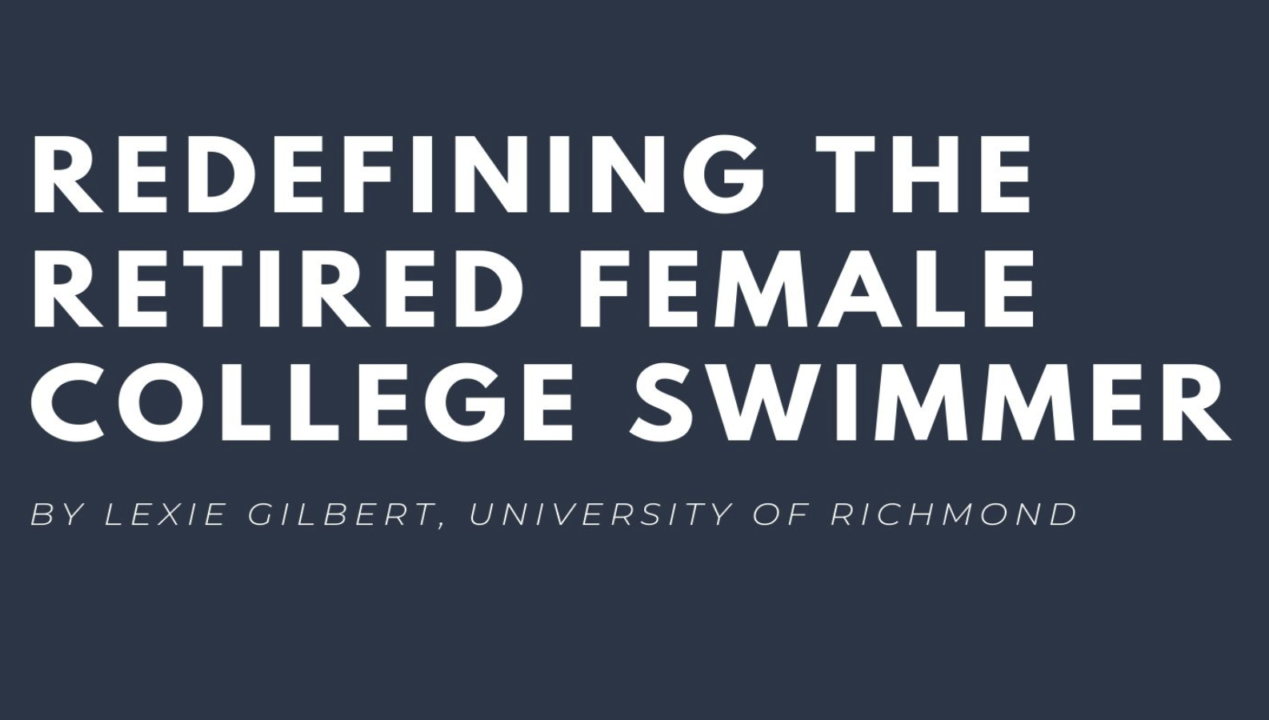For her senior capstone project, University of Richmond swimmer Lexie Gilbert studied the retirement process of female college swimmers.
She gathered data from over 100 retired female college swimmers and in hopes of understanding the “struggles of the retirement process and provide recommendations to help during this process,” Gilbert told SwimSwam.
Gilbert gathered survey responses from 109 retired student-athletes across 21 NCAA universities. The average age of respondents was 28 with completed swim careers spanning an average of approximately 15 years. Respondents were asked questions regarding general demographics, attitudes towards senior year spring semester, current exercise habits and attitudes, career, and relationship with swimming.
According to Gilbert’s findings, many respondents felt as though they had lost who they were once they retired from swimming. “Being a collegiate swimmer is a huge part of your identity,” one swimmer said, adding that it’s “something [they] realized until after the fact.”

Courtesy Lexie Gilbert
Gilbert also sought to understand current exercise habits of retired female swimmers. Approximately 95% of respondents had a current interest in exercise, but only 47% had a structured exercise schedule. Forty-three percent of respondents stated that they still swim today, but only 8% swim on a daily basis. Motivations for exercise included: for fun, for fitness, for a competitive purpose, for social reasons, and for mental health.
Finally, Gilbert asked participants about their “current sentiments toward swimming.” Approximately 63% of respondents stated they missed swimming. “Whenever I am able to put on my cap and goggles, it feels like home,” one respondent said.
Upon completing her research, Gilbert came up with three key recommendations “to make this process easier.”
The first “developing a fundamental and honest understanding of the retirement process,” the second is “understanding your personal self,” and the third is “initiating conversations.”
“Developing a fundamental and honest understanding of retirement recognizes that the retirement process is a gradual real life transition process. Understanding your personal self requires you to identify your personal values and internal motivators that helped drive you in the sport of swimming. Part of this process is recognizing and removing the external motivators (coaches, teammates, time standards) that once motivated you,” Gilbert wrote.
“Your driving focus in life should be from your internal motivators and personal values. And lastly, it is important to initiate conversations. There is a recurring stigma around the retirement process. The stigma of retirement needs to shift from fear or uncertainty to opportunity. These conversations need to take place prior to the student-athletes senior year in order to help the athletes. Conversations should be positive and supportive. They should address and support all the mixed emotions that come with the retirement process.”
Click here to view infographics based on Gilbert’s research, and here to view her entire paper.

Graduated from a D1 school in 06. Went to grad school and ended up losing about 40 lbs after swimming, not in a healthy way. Since I was afraid I would blow up without swimming 3-4 hrs a day after college. Then 3 yrs later was sick of the depriving myself of food and gained 60 lbs but with overexercising. Took another 3 yrs to start a healthy relationship and balance with food and exercise. Never thought I would struggle like that. It is tough after swimming so many years of your life and ending a D1 (or any D really) experience…in Masters swimming now for the last 6 years and love it!!
I completely agree with you on the body issues. I had to red shirt my junior year of college because of an injury (I’m a D1 swimmer) and ended up taking 1.5 years off. During that time I struggled so much mentally and emotionally with muscle loss and not knowing what my body should look like during that time. Fast forward to today, I just finished my senior season but am in the exact same position. I really appreciate this research.
I think a lot of these ladies and any retired swimmer could find joining the Masters swimming community a help either during an adaptation period or in the long term as it give former competiiors a lot of what motivated them as elite swimmers.
Love this!!! Went through it myself many many years ago, and will share this insight with my 2 female swimmers, one of which is currently a D1 swimmer and the other a rising senior in high with thoughts of swimming in college. Hopefully these insights will make their transitions a little more seem less than mine was. Thanks!!!
Swimming is a sport you can do all your life. Looked at Masters swimming and Senior Olympics competitions. It just once you finished college you have to get a job and then of course from 25 up people start to have families. Once they get adjusted to family life and work, people can return to swimming in masters.
I feel female swimmer,s have to deal with pressure to be the Best